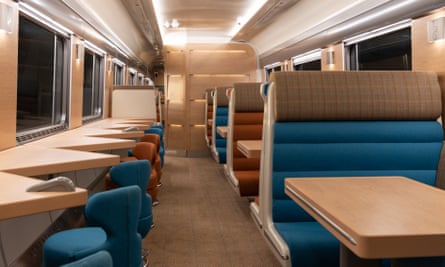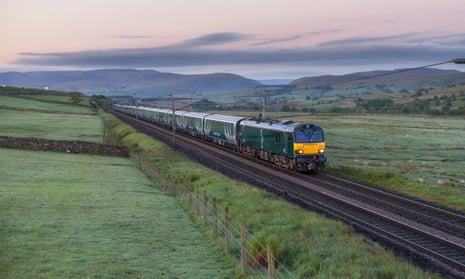With luxury double rooms, en suite showers and a breakfast service which includes smoothie bowls and eggs royale, the relaunch of the renowned Caledonian Sleeper just over 100 days ago seemed to have elevated the train service to the highest standards of luxury and convenience.
But since the £150m fleet of trains was introduced in April, it has been beset with difficulties – from severe delays and botched reservations to food shortages and a broken air conditioning unit. One passenger complained of a power cut, while another one was forced to sleep with the lights on.
More than one in three of the sleeper trains heading to Edinburgh from London Euston arrived late between 25 May and 22 June, according to the latest available figures.
Other trains on the service’s Lowland route were similarly troubled, with only 71% of trains from Euston to Glasgow and 67% of trains heading back to London from the Scottish cities arriving on time.
Last week, an investigation was launched after a sleeper train was forced to make an emergency stop when it overshot the platform at Edinburgh Waverley station.
The operator, Serco, has described the issues as teething problems and insisted it was “working very hard” to improve the service.
But passengers’ criticisms of the trains, billed as a “hotel on wheels”, on social media have gone well beyond the timetable. One disgruntled passenger, 47-year-old Simon Meldrum, told the Guardian that a recent journey from Euston to Bridge of Orchy had been a “triumphant attempt by Serco to fail in as many ways as possible”.
In June, the company announced that the introduction of more new trains on the Highlands route – which goes to Fort William and Inverness – would be delayed until after the summer holiday season.
The hold-up meant that shortly before his £310 trip on Friday 28 June the company gave Meldrum a partial refund because his room could not be provided.
Then, an onboard power failure meant there was no lounge car or food service, and he was told to retire to his cabin at 8.30pm. “So far so bad,” said Meldrum, who said that when he arrived, “the bunks had been made up for two people, so I was unable to sit up in bed”.
Although he was scheduled to reach his destination shortly after 8am, Meldrum said he was informed by staff in the early hours that he would need to disembark at Dundee at 6.15am and take a 100-mile taxi ride the rest of the way.
Many of those who were promised “a magical journey” on the revamped Caledonian Sleeper have experienced similar problems since its first evening, when the train from London Euston eventually rolled into Glasgow two-and-three-quarter hours behind schedule.
Public contractor Serco is no stranger to controversy, having been fined £22.9m last month over government electronic tagging contracts.
On Wednesday evening, campaigners disrupted the sleeper service to protest against Serco’s decision to evict two asylum seekers from their Glasgow homes.
Ryan Flaherty, Serco’s managing director for Caledonian Sleeper, said setbacks “are to be expected in the first few months”.
“We’re working hard to address the issues identified by guests and are already seeing significant improvements,” he said.
“We apologise to any guests whose experience hasn’t matched their expectations and are confident things will continue to get better over the coming weeks.”

The company is also confident that the next set of performance figures will show improvements in punctuality.
Caledonian Sleeper’s Twitter account reveals that on 14 out of 31 days in July, its operators were forced to apologise for delays on both the Lowlander and Highlander services.
In response to the issues, members of the RMT union have voted in favour of industrial action, claiming they are “paying the personal price” for the problems that have arisen.
The passenger watchdog Transport Focus said independent research found that customer satisfaction levels with the service had fallen steadily since February this year. For the period 25 April-22 June, overall satisfaction stood at 50%.
Robert Samson, senior stakeholder manager in Scotland for Transport Focus, said: “Passengers continue to face a significant level of unpredictable delay on the Caledonian Sleeper service and anecdotal reports suggest some face significant problems that result in a poor journey experience.
“It is vital that Serco makes every passenger on a late service aware of their rights to a refund under the delay repay arrangements and makes it easy to claim.
“Likewise, it is vital that passengers express their dissatisfaction by claiming delay repay compensation – every time they are eligible – and complaining about poor service quality too.”
Meldrum’s 85-year-old father had planned to visit from England on the new rolling stock, but has been deterred by his son’s experience. “He said he’s not going to do it because it would finish him off,” Meldrum said.
